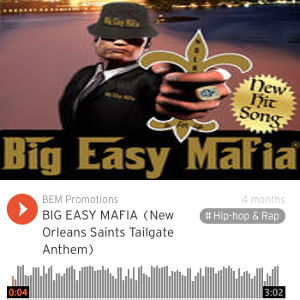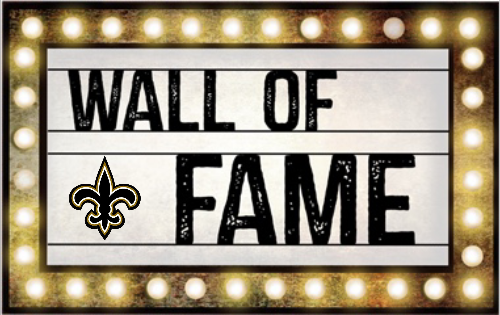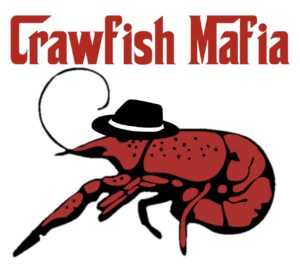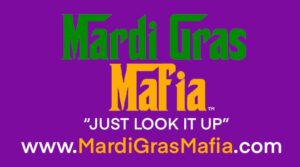The Terms Of Native New Orleans
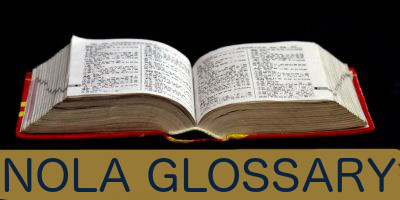
ALGIERS POINT – You’re likely to hear this pronounced as “Al-jeers Pernt.”
ALLIGATOR PEAR – Avocado.
ANYWAYS – And, then; and, so.
AWRITE – The appropriate response to the greeting “Where y’at?” Also, a greeting in and of itself: “Awrite, Ed!”
AWRITE, HAWT – A female response of agreement.
AX – Ask.
BACKATOWN – (i.e., “back of town”) the section of New Orleans from the River to North Claiborne, popularly used in the 6th and 7th wards.
BANANAS FOSTER – This is a dessert made from bananas and vanilla ice cream, with the sauce made from butter, brown sugar, cinnamon, dark rum, and banana liqueur.
BANQUETTE – The sidewalk. Pronounced . Usage fairly rare nowadays.
BARBECUE SHRIMP – Created by Pascale’s Manale, this shrimp dish is served in an herbed butter sauce, not a traditional barbecue sauce.
BERL, BERLED CRAWFISH – “Berl” is the New Orleans pronunciation of the word “boil.” A crawfish boil is a get-together where crawfish are boiled live with seasonings, corn, garlic and red potatoes.
THE BEST BANK – Slang for the West Bank, an area on the Western side of the Mississippi River
THE BIG EASY – The nickname for New Orleans because of the easy carefree lifestyle
THE BIG EASY MAFIA- The name of the official fan club of the Who Dat Nation (Saints Football)
BOO – A term of endearment, frequently used by parents and grandparents for small children, even small children who happen to be 40 years old … Believed to be Cajun in origin.
BOEUF GRAS – Suggests that the day before Lent traces its roots to ancient Greece and Greek mythology. Boeuf Gras or Fat Bull = Fat Tuesday.
BOURRE – A trick-taking gambling card game primarily played in the Acadiana region of Louisiana.
BRAKE TAG – An inspection sticker on your car, proof that you’ve passed the required annual safety inspection. It encompasses several areas of your car (e.g., horn, wipers, etc.) but is primarily concerned with the integrity of your brakes. Given the fact that New Orleans is surrounded by various lakes, rivers and canals, a bad set of brakes could mean that you might end up at the bottom of one of those bodies of water at the very least.
BREAD PUDDING (New Orleans Style) – Lightly spiced bread pudding, flavored with bourbon, bourbon sauce and bourbon-soaked raisins.
BY MY HOUSE, BY YOUR HOUSE, etc. – Analogous to the French terms “chez moi”, “chez toi”, etc. Usage: “He slept by my house last night.” “At” is never used in this sense.
CAFÉ AU LAIT and BEIGNETS – Coffee made with steamed milk and fried dough with powdered sugar on top, served at Café Du Monde in the French Quarter.
CAFÉ BRULOT – A flaming concoction of coffee, brandy, and spices served at Antoines Restaurant in New Orleans.
CAJUN – A member of any of the communities in southern Louisiana formed by descendants of French Canadians, speaking an archaic form of French.
CALAS – Fried balls of rice and dough, covered in powdered sugar.
CAMELBACK – Second floor additions of a shotgun style house.
CAPTAIN – The head of an organization that puts on Mardi Gras parades.
CAP – A form of address for men, usually ones with whom you are not acquainted. Women generally do not use this term.
CARNIVAL – Carnival is the season prior to Lent, where Mardi Gras is celebrated with parades and revelry.
CATLICK – The predominant religion in New Orleans.
CEMENT – A standard English word, but with a special pronunciation. Locals say Locals say “SEE-ment”, not “suh-MENT.”
CHALMETIAN, CHALMATION – Someone from Chalmette, a city in St. Bernard Parish that’s part of the New Orleans metro area, often called “Da Parish.” Out-of-towners often pronounce it with the hard “ch” sound as in “charge”. It’s more like “shall-MAY-shen” or “shall-ME-shen,” and the city is pronounced “shall-MET.”
CHARMER – The quintessential female Yat. Pronounced “CHAW-muh.”
CHER – pronounced “share.” Means “dear,” in French; mostly used in Cajun Country.
CHICKEN CLEMENCEAU – This old Creole dish is kept alive almost single-handedly by Galatoire’s.
CHIEF – A form of address between men, along the lines of “cap” and “podna”.
COARDNER – Corner. As in, “I’m going down to the coardner to get me a shrimp po-boy.”
CRESCENT CITY CLOTH- The official rally towel for Saints football created by the Big Easy Mafia to put the Gris Gris on the opponent. www.crescentcitycloth.com
CREOLE CREAM CHEESE – A farmer style cheese similar in fashion to a combination of cottage cheese and sour cream. Although originally a product of France, many New Orleans dairies such as Goldseal and Bordens supplied the city with the product for many years. Today, Creole cream cheese may be purchased from Dorignac’s on Veterans Hwy in New Orleans
.
CUSH-CUSH, KUSH-KUSH, COUCHE-COUCHE – An old French/Cajun breakfast dish my grandmother used to prepare. The words rhyme with “push”, and it is prepared by browning or searing cornmeal in an oil glazed pot till light brown, then served hot with sugar and milk in a bowl, just like cereal.DA, DAT – The, That.
DAUBE GLACE’ – A cold hors d’oeuvre of gelled beef.
DAWLIN’ – A universal form of address. Women use it to refer to both sexes, men use it toward women.
DEM – Them.
DERE – There. As in “Dere ya go!”, an expression of encouragement or acknowledgement of having done something for someone else.
DESE, DOSE – These, those.
DODO, MAKE DODO – Sleep. From the Cajun French “fais do do”, or “make sleep”. In Acadiana, the term “fais do do” is used for a Cajun dance, and is thought to have originated when the parents would tell their kids to hurry up and “fais do do” so that they could go to the dance; alternately, it’s said that the hosts of the house dances (bals de maison) would have a separate room for parents to put their small children, and the lady watching them would keep singing lullabyes and saying “fais do do” so that they could sleep amidst the din of the dancing Cajuns.
DOUBLOON – Pronounced “da-BLOON.” A coin, approximately the size of a silver dollar, minted on a yearly basis by the various Mardi Gras krewes. The standard type is made of aluminum and they’re thrown from Mardi Gras floats by the parade riders. The distinctive sound of a doubloon hitting da cement is enough to start a mad scramble, where you’re likely to trample on an old lady, or alternately be trampled by an old lady.
DOWN DA ROAD – A staple in the vocabulary of the St. Bernard Parish Yat. This term is travel directions for someone headed to lower St. Bernard Parish traveling on St. Bernard Highway (US Highway 46). You are usually in da parish when you use this phrase with a destination of either Violet or Poydras.
DRESSED – When ordering a po-boy, “dressed” indicates lettuce, tomatoes, pickles and MYNEZ, on it.
EARL, ERL – 1. A vegetable product used for cooking, making roux, etc. 2. A petroleum product used to lubricate the engine of your car. 3. Your Uncle Earl. (Most New Orleanians have an Uncle Earl.)
ELLESHYEW – Louisiana State University, Baton Rouge.
ERNGE, URNGE – An orange-colored citrus fruit.
ERSTERS, ERSTAS – Oysters.
ESPLANADE – Walkway. The street name is pronounced “es’-pluh-NADE”, and the last syllable rhymes with “raid”, not “rod”.
FAT CITY – An area of Metairie, Louisiana that was commonly associated with its nightlife in the 1970’s and 80’s.
FAUBOURG – A suburb or outlying neighborhood, as in Faubourg Marigny. Usually pronounced “FO-berg” by natives.
FLYIN’ HORSES – A merry-go-round, sometimes specifically describing the merry-go-round in City Park.
GO CUP – A paper or plastic cup for consumption of alcoholic beverages out on the street, as open glass containers are illegal.
GOUT – Pronounced “gooh.” French for “taste.” Usually applied to coffee. As in, “You want a little gout?” Mostly old people are the only ones still saying this.
GRILLADES AND GRITS – (Pronounced “GREE’-ahds”) A hearty dish of round steak, generally eaten for breakfast.
GRIP – A small suitcase, usually not a hard-shell one, more like a schoolbag or an overnight bag. Other locals have used this to refer to all types of suitcases. “Don’t fo’get ya grip!”says ya mamma, as you’re leaving the house.
GRIPPE – The flu.GRIS-GRIS – Pronounced “GREE-GREE.” A (voodoo) spell. Can be applied for nefarious purposes (“to put a gris-gris on someone”), or as a force to ward off evil, like wearing a gris-gris bag.
GUMBO (SEAFOOD)– A spicy stew that’s a staple in the Cajun and Creole Cultures. Seafood-based gumbo generally has shrimp, crabmeat, and sometimes oysters.
GUMBO YA YA – Everybody talking all at once; i.e., at a loud party.
GUMBO Z’HERBS – A meatless gumbo traditionally made on Holy Thursday to eat the next day on Good Friday.
HAWT – A term of endearment used primarily by local females.
HEY, BAY-BEE! – Pronounced with the “BAY” drawn way out. A greeting between any two people of either gender.
HOUSE COAT ‘N CURLAS – The preferred dress for charmers while shopping at Schwegmann’s.
HUCK-A-BUCKS or HUCKLE-BUCKS – Frozen Kool-Aid in a Dixie cup. A way to keep cool during the summer.
HURRICANE PARTY – A tradition of the south to hold a get-together before or during a hurricane.
I’LL TAKE ME A – A phrase New Orleanians use instead of “I would like a….” “I’ll take me a shrimp poboy, please.”
INDIANS (MARDI GRAS INDIANS) – African-American Carnival revelers who dress up for Mardi Gras in suits influenced by Native American ceremonial apparel.INKPEN – A pen.
IT DON MADDA – Typical of New Orleans accents, this phrase means, “It does not matter.”
JAMBALAYA – A rice-based dish containing meat and seafood, prepared in a nearly infinite variety of ways by Louisianians.
JAWN – This is the pronunciation that many use for the name, “John.”
K & B, K&B PURPLE – Drugstore known in New Orleans for its unique purple color. Used in phrases like, “He was so mad, his face was K&B purple”, or, “I can’t believe ya bought dat ugly car! It’s K&B purple!”
KING CAKE – A New Orleans cake served during Mardi Gras season. A small plastic doll is hidden inside of the cake, and whoever “gets the baby” has to buy the next King Cake.
KREWE – A krewe (pronounced in the same way as “crew”) is an organization that puts on a parade and or a ball for the Carnival season.
LAGNIAPPE – Something given as a bonus or extra gift.
LOCKA – Where you hang your clothes, analogous to the English word “closet”. Example: “Mom-MAH! Where my shoes at?” “Looka in ya locka!”
LOOKIT DA T.V. – To watch T.V. Locals don’t watch T.V., they look at it. Oh, and in proper Localese form, it’s pronounced , emphasis on the first syllable.
LOST BREAD, PAIN PERDU – Cajun style French toast.
LUNDI GRAS – Lundi Gras is “Fat Monday,” the day before Mardi Gras “Fat Tuesday.”
MAKE GROCERIES, MAKIN’ GROCERIES – To do grocery shopping. Thought to have originated with the French expression for grocery shopping, “faire le marché”. The verb “faire” can mean either “to do” or “to make”, and the idiom may have been mistranslated.
MARDI GRAS – This grand pre-Lenten celebration for which New Orleans is famous.
MARRAINE – Pronounced “MAH-ran.” Your godmother. Elsewhere the terms “nanny” and “nanan” (pronounced NAH-nan) are also used for godmother.
MASKER – A person taking part in a masquerade or masked ball.
MAW-MAW – Ya grandma.
METAIRIE, METRY – Standard New Orleanian pronunciation: ”MET-ah-ree.” Hardcore local pronunciation: “MET-tree,” as if it was spelled (and sometimes is spelled), “Metry.”
MIRLITON – A vegetable pear or chayote squash, which grows wild in Louisiana and in backyards throughout New Orleans. Pronounced “MEL-lee-tawn,” and wonderful when stuffed with shrimp and ham.
MUFFULETTA – A quintessential New Orleans Italian sandwich of ham, Genoa salami, mortadella, Provolone cheese and marinated olive salad on a round seeded Italian loaf. Invented at Central Grocery on Decatur in da Quarter.
MYNEZ – Mayonnaise.
NEUTRAL GROUND – The grassy or cement strip in the middle of the road. The terms “median” and/or “island” are NEVER used in New Orleans. If you’re lucky, you live on a street with a neutral ground big enough to play football on.
NUTTINONIT – A po-boy that is not dressed, which only contains the main ingredient(s).
ON DA WES’ BANK, ACROSS DA RIVUH, OVA DA RIVUH – On the West Bank of the Mississippi River, where such places as Algiers, Gretna and Marrero lie. Interestingly, the West Bank is due south of New Orleans (except for Algiers, of course). Make sense? Thought not.
OYSTERS BIENVILLE – This sumptuous dish is served in many New Orleans restaurants. It is said that it invented over 75 years ago at Arnaud’s Restaurant, but Antoine’s Restaurant also claims to have invented it in the 1940s.
OYSTERS (CHARGRILLED) – A dish popularized by Drago’s restaurant, where the oysters are topped with garlic, butter, and Parmesan cheese, then cooked in the half-shell on top of a grill.
OYSTERS MOSCA – Signature dish of Restaurant Mosca; typically contains oysters, bread crumbs, fresh parmasean cheese, herbs, garlic, and olive oil.
OYSTERS ROCKEFELLER – Created at the New Orleans restaurant Antoine’s, consists of oysters on the half-shell that have been topped with various other ingredients (often parsley and other green herbs, a rich butter sauce and bread crumbs) and are then baked or broiled.
PAIN PERDU, LOST BREAD – Cajun French toast.
PARISH – A Louisiana state administrative district, analogous to the American “county”. When used by locals in the phrase “da parish”, it generally means St. Bernard Parish specifically, which is suburban to New Orleans.
PARRAINE – Your godfather.
PASS A GOOD TIME – Have a good time.
PASS BY – To stop by.
PASS THE VACUUM – The New Orleans way of saying to quickly vacuum.
PECAN – A nut indigenous to the South, and beloved in New Orleans as an ingredient in pies and pralines. Pronounced “puh-KAWN,” not “PEE-can.”
PICAYUNE – Formerly a Spanish coin, the name is now used as part of the New Orleans newspaper (The Times-Picayune).
PIROGUE – A long narrow canoe made from a single tree trunk.
PO-BOY – The quintessential New Orleans lunch, a sandwich on good, crispy New Orleans French bread.
PODNA – A form of address for men, usually for ones with whom one is not acquainted. Frequently used in the emphatic statement, “I tell you what, podna …”
POMPANO EN PAPILLOTE – Created at Antoine’s Restaurant in New Orleans, this dish is a filet of pompano (fish) that is baked in a sealed parchment paper envelope with a white sauce of wine, shrimp, and crabmeat.
PRALINE – A sugary Creole candy, invented in New Orleans (not the same as the French culinary/confectionery term “praline” or “praliné”) The classic version is made with sugar, brown sugar, butter, vanilla and pecans, and is a flat sugary pecan-filled disk. There are also creamy pralines, chocolate pralines, maple pralines, etc.
RED BEANS AND RICELY – Celebrated jazz trumpeter and New Orleanian Louis Armstrong’s favorite food was red beans and rice. The musician famously signed his name “Red Beans and Ricely Yours, Louis Armstrong.”
REGULAH COFFEE – Not “Black Coffee” as in the rest of the country. “Regular” includes lots of sugar and cream.
SCHWEGMANN’S BAG – Schwegmann’s was a New Orleans grocery store that used its grocery bags for advertising of local businesses. The grocery bags were commonly used to store Mardi Gras beads.
SHOTGUN – A style of house that has one room leading to the next, without hallways.
SHOW, DA SHOW – The cinema. The movie house. The local motion picture emporium. True New Orleanians never say, “I went to the movies”, they say “I went to da show.”
SILVER DIME – A small coin of U.S. currency, worth ten cents. Always pronounced with the emphasis on the first syllable, even though they haven’t been made of actual silver for over 35 years.
SKEETA HAWK – Or, “mosquito hawk”, the local name for a dragonfly.
SAC AU LAIT – A type of freshwater fish that is popular in South Louisiana.
SHRIMP REMOULADE – (pronounced ruma-lahd) is a cold shrimp appetizer with a pink, creamy sauce flavored with horseradish.
SOSSIDGE – A meat preparation, made of various kinds of ground meats, seafood and spices, stuffed into a casing. Usually spelled “sausage” by English speakers, but pronounced in New Orleans as you see here.
SNOWBALL – Shaved ice with a syrup flavor added to it. Many New Orleanians like to add ice cream and/or condensed milk
STOOP – Usually expressed as “da stoop”. The front steps to your house, particularly if it’s a shotgun duplex. What ya go out and sit on to chat wit’ya neighbas (an’ ta keep an eye on ’em).
SUCK DA HEAD, SQUEEZE DA TAIL – The technique for eating crawfish. If you’ve never done this, have someone demonstrate.
SUG – “Sugar”- A name that local women may call people.
THROW ME SOMETHIN MISTA – This is what New Orleanians yell to Krewe members of parades during Mardi Gras.
TURLET – Ya standard flushable porcelain waste disposal unit found in every bat’troom, referred to by English speakers as a “toilet”.
TURTLE SOUP – This soup is a great delicacy in Louisiana.
TWINSPAN – Parallel bridges that cross the eastern end of Lake Pontchartrain in southern Louisiana from New Orleans, Louisiana to Slidell, Louisiana.
UPTOWN SIDE, DOWNTOWN SIDE, LAKE SIDE, RIVER SIDE
UP DA ROAD – Same as down da road, only now you are traveling in the opposite direction heading “up da road” to either Chalmette or ArabiVEDGEATIBBLE – Neither animal nor mineral. What ya mamma used to make ya eat before ya could leave the table when ya were a kid. The word has four syllables.
WHERE YA STAY (AT)? – Where do you live?
WHERE Y’AT! – The traditional New Orleanian greeting that means “What’s up or where are you?” Also the source for the term “Yat,” to describe New Orleanians with the telltale accent. The proper response is, “Awrite.”
WHO DAT? – This phrase is part of the Saints chant that is traditionally started at the beginning of all New Orleans Saints home games in the Superdome. “Who dat? Who dat say dey gonna beat dem Saints?”
WRENCH – To clean something under running water. “Aw baby, ya hands ‘r filthy! Go wrench ’em off in da zink.” See ZINK.YAKAMEIN – A spicy beef noodle soup with sliced green onions and a hard-boiled egg half.
Y’ALL – A common New Orleans phrase meaning, “you all.”
YA MAMMA – Your mother. Used in a variety of ways, usually endearing. Also usable as an insult, specifically as a simple retort when one is insulted first; simply say, “Ya mamma.” Be prepared to defend yourself physically at this point. I once saw my classmate Vince G. beat the crap out of someone (and someone a year older, at that) back in high school at Holy Cross for uttering this retort.
YA MAMA’EN’EM– New Orleans slang for,”your mom and them.”
YAT – From the traditional New Orleans greeting “Where y’at?” The term “Yat,” describes New Orleanians with the telltale accent.
YEAH YOU RITE – An emphatic statement of agreement and affirmation, sometimes used as a general exclamation of happiness. The accent is on the first word, and it’s spoken as one word.
ZATARAIN’S – Pronounced “ZAT-uh-rans.” A local manufacturer of spices, seasonings, pickled products and condiments. In context, it’s used by some as a generic term for either crab boil or Creole mustard, as it “Put some Zatarain’s on it,” or “T’row a coupla bags o’ Zatarain’s in da pot.” Context is important here; you don’t want to put Creole mustard in a seafood boil.
ZINK – A receptacle for water with a drain and faucets. Where ya wrench off ya dishes or ya hands. See WRENCH.





